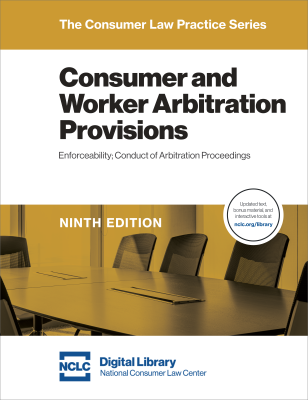A recent state supreme court decision highlights an important weapon consumer litigants may utilize when faced with a requirement to arbitrate under American Arbitration Association (AAA) rules. They can proceed with the arbitration before the AAA and see if the defendant timely forwards the hefty amount of arbitration costs for which AAA rules require it to pay. If it fails to do so, thus breaching its obligations under the arbitration agreement, the consumer should then be able to move the case back to court. See NCLC’s Consumer Arbitration Agreements § 8.4.4. See also another recent NCLC article, "Defendant’s Conduct May Waive Arbitration Requirements."
Under AAA Consumer Arbitration Rules, after the consumer pays a $200 filing fee, the defendant must pay a $1500 filing fee, a $500 hearing fee, and $1500 arbitrator compensation per hearing day. The defendant will even have to pay the consumer’s $200 fee if the arbitration agreement provides the company will pay all costs. See Id. Appx. C.2, Costs of Arbitration.
In many cases, particularly cases against auto dealerships, the defendant refuses to pay the costs. The result should be that AAA will send the parties a letter stating that, because of this failure, it will not administer the arbitration or any other consumer disputes involving the defendant. The consumer can then raise the same dispute in court, arguing that the arbitration requirement no longer applies because of the defendant’s material breach.
New Jersey Supreme Court Joins Other Courts: Refusal to Pay Waives Arbitration Requirement
In Roach v. BM Motoring, LLC, 2017 WL 931430 (N.J. Mar. 9, 2017), the New Jersey Supreme Court has just joined other courts that find the defendant’s refusal to pay arbitration costs waives the arbitration requirement by materially breaching the agreement. See e.g. Pre-Paid Legal Services, Inc. v. Cahill, 786 F.3d 1287 (10th Cir. 2015); Sink v. Aden Enterprises, Inc., 352 F.3d 1197 (9th Cir. 2003); Sanderson Farms, Inc. v. Gatlin, 848 So.2d 828 (Miss. 2003). See also NCLC’s Consumer Arbitration Agreements § 8.4.4.
Roach involves two separate consumer disputes, both against the same car dealership and both covered by an arbitration provision that requires arbitration in accordance with AAA rules, but that does not explicitly require arbitration before AAA. In one case, the consumer filed with AAA for arbitration against the dealer, but after multiple notices and warnings, the dealership failed to pay AAA’s filing fees and arbitrator compensation deposit. AAA sent the parties a letter stating that because of this failure it would not administer the arbitration or any other consumer disputes involving the dealership.
The second case came after AAA had sent the dealership this letter. The consumer filed an arbitration with AAA, and AAA responded to both parties by letter stating that the dealership had previously not complied with the AAA’s request to adhere to its policies, and that it could not accept for administration any disputes involving the dealership. The dealership took no action to reinstate the arbitration by paying fees or identifying a different forum.
The consumers then filed their claims in the second case in state court and the dealership moved to compel arbitration. The New Jersey Supreme Court concluded on appeal that the dealership was precluded from enforcing the arbitration agreement.
The Court’s Reasoning
The Roach court began with the fundamental tenet that when a party breaches a material term of an agreement, the non-breaching party is relieved of its obligations under the agreement. It then concluded that the arbitration terms (by requiring use of AAA rules) permitted arbitration before the AAA arbitration (or at least left open to question the proper arbitration forum), so that the court would not disturb the consumers’ choice to arbitrate with the AAA. The dealership materially breached the agreement where the consumer paid the consumer’s filing fee and the dealer did not pay its fees or otherwise engage in arbitration after the AAA refused to arbitrate the dispute.
A State Legislative Solution
For possible state-level reforms to address the problem of defendants not paying their required arbitration fees, see NCLC’s Model State Consumer and Employee Justice Enforcement Act Title VIII.


